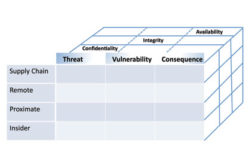Articles by Steven Chabinsky
Network security practitioners are well aware of the challenges posed by removable data storage devices, including thumb drives.
Read More
5 Common Mistakes in Cyber Incident Response
Network intrusions have become a fact of corporate life, and increasingly are viewed as among the many costs of doing business.
August 1, 2014
7 Free Cybersecurity Planning Resources for SMEs
Cybersecurity is now a primary concern of senior executives within both the Fortune 500 and, perhaps more importantly, the “SME 28.”
July 1, 2014
Facing an Uncertain Future in Cybersecurity Enforcement
The FTC has become the nation’s leading force to drive and enforce consumer privacy
June 1, 2014
Why Cybersecurity is a Business Necessity
For well over a decade, CEOs have been relegating the operational, legal, reputational and competitive risks associated with cybersecurity to those responsible for Information Technology.
March 1, 2014
Why You Need Cybersecurity Risk Management
Governments and corporations are facing considerable risk to their data
February 1, 2014
How to Reduce the Insider Cyber Threat
To best protect your company against internal abuse, it is helpful to understand the nature of the threat and to consider applying risk-based approaches to address the problem.
January 6, 2014
What to Expect When Working with Cyber Cops
What your company, as a victim of a computer intrusion, should expect when working with the Feds.
December 1, 2013
Top 5 Reasons to Report Computer Intrusions to Law Enforcement
Even when not legally required, reporting cyber crime to law enforcement can act as a deterrent for other malicious actors contemplating future attacks.
November 5, 2013
What Has Been Accomplished on Cyber Legislation?
In response to the growing cyber threat, Congress has been busy drafting legislation.
October 1, 2013
Sign-up to receive top management & result-driven techniques in the industry.
Join over 20,000+ industry leaders who receive our premium content.
SIGN UP TODAY!Copyright ©2024. All Rights Reserved BNP Media.
Design, CMS, Hosting & Web Development :: ePublishing










